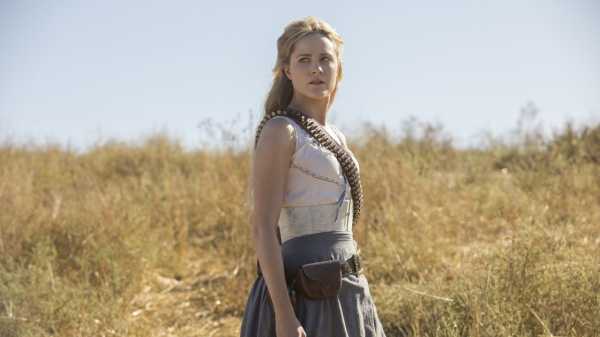
At the end of the first season of “Westworld,” the artificially intelligent humanoids who populate the titular Wild West theme park—outlaws and barmen and cowgirls, all called “hosts”—rose up in revolt to slaughter a collection of human executives and investors gathered at a cocktail party. Thus, Season 2 of HBO’s deeply gloomy drama (returning Sunday) picks up with a mass autopsy of sorts. “This’ll get gross,” a new character says early in the première, delivering his content advisory after having already carved open the skull of a host; as he squished through its gray matter to access its central processing unit, I wondered if the makers of “Westworld” had considered repurposing his warning as a tagline.
Shots to heads, slashings of throats, grisly surgeries, grotesque invasions—these, frequent to the point of deadening tedium, are the least of the program’s assaults on delicate sensibilities. What distinguishes the sadism of “Westworld” (co-created by Jonathan Nolan and Lisa Joy, and inspired by the 1973 Michael Crichton film of the same name) is its philosophical perspective. First of all, it has one. Last season, Robert Ford (Anthony Hopkins), one of the architects of the theme park, spoke directly of his belief that “stories helped us to ennoble ourselves, to fix what was broken in us, and to help us become the people we dreamed of being.” This view was married to a conviction that the key to consciousness is suffering: that a host’s cognitive awakening depended on its memory of emotional pain. The makers of the show seemed to put into practice the outlook of its world-builders: contriving a rigorously convoluted story and tormenting their audience with narrative intricacy.
The first season, prizing cleverness above clarity, presented an artful jumble of time lines. The viewer may have been slow to realize, for instance, that the optimistic human adventurer William (Jimmi Simpson) was not a contemporary of the not-quite-nihilistic black hat played by Ed Harris. They were the same person, depicted at a remove of decades. Only once the viewer realizes this does each man’s relationship with a host named Dolores (Evan Rachel Wood) make sense. Likewise, it required many weeks to understand that Dolores’s interactions with the fellow named Bernard (Jeffrey Wright) are flashbacks to her relationship with another creator of Westworld, Arnold, and that Bernard is actually a host forged in Arnold’s image.
Until you sort out such complexities, you are just along for the thrill ride, indulging the “part of you that wants to hunt and kill,” as Dolores says, much like the guests spending forty thousand dollars a day to indulge their fantasies of shooting sheriffs and deputies. Once you grasp that making heads or tails of “Westworld” demands not just close attention but fastidious analysis—that you’ve been ambushed into untangling a knot—you may feel cruelly treated in turn.
Everyone loves a puzzle, but “Westworld” has discovered a base of fans who delight in its torturing gamesmanship, which serves its view of life in the state of nature as nasty, brutish, and punishingly long. The faithful seem not to mind unpacking a story to reveal, mostly, more stories, as opposed to insights or lyrical wonders. The synopses above are pitiful attempts to describe the plot machinations succinctly; the whole thing is pitilessness itself, from the construction of its puzzles to its reversals of satisfactions. It was fitting that, in a recent appearance on Reddit, Nolan and Joy taunted fans by promising a spoiler-rife preview of Season 2, only to deliver a variation on a rickrolling prank; here was a vision of the showrunner as troll, conflating brain-teasers with taunts.
What Arnold and Robert Ford hoped for in creating Westworld was that the hosts, developing consciousness, would evolve into a race representing an improvement on humanity. Meanwhile, the creators of “Westworld” the television show have generated a media experience that transcends passive entertainment; the first season carried itself as if it had evolved beyond linear storytelling, and the series retains this posture as it presses forward. Gazing at its vision of the past, we see Arnold’s tinkering with and tutelage of Dolores, the Pygmalion story redone along dystopian lines. Looking through our fingers at the present, in the aftermath of the robot uprising, we are pleased to lay eyes on Maeve (Thandie Newton), a host who is searching for a daughter whom she longs for, thanks to her newfound consciousness; Maeve supplies rare flashes of wit to a series that often equates humorlessness with seriousness of purpose. Squinting at the future-most story line, I still don’t know all that is happening with the Man in Black, though I appreciate the way that Harris, placing the black hat on his head, switches on a mean grin as if he’s flicked a switch within his corrupted soul.
The problem with “Westworld,” though, is its insistence that souls are inherently corrupt. A low opinion of humankind may be a prerequisite to full enjoyment of the series. The viewer, less confused by the weave of time lines, is on firmer footing this season, but the show continues to obscure motivation to the point of making motivation irrelevant. That would amount to a denial of the humanity that we are supposed to be interrogating, with the result of reducing the series to a parlor game.
Sourse: newyorker.com






